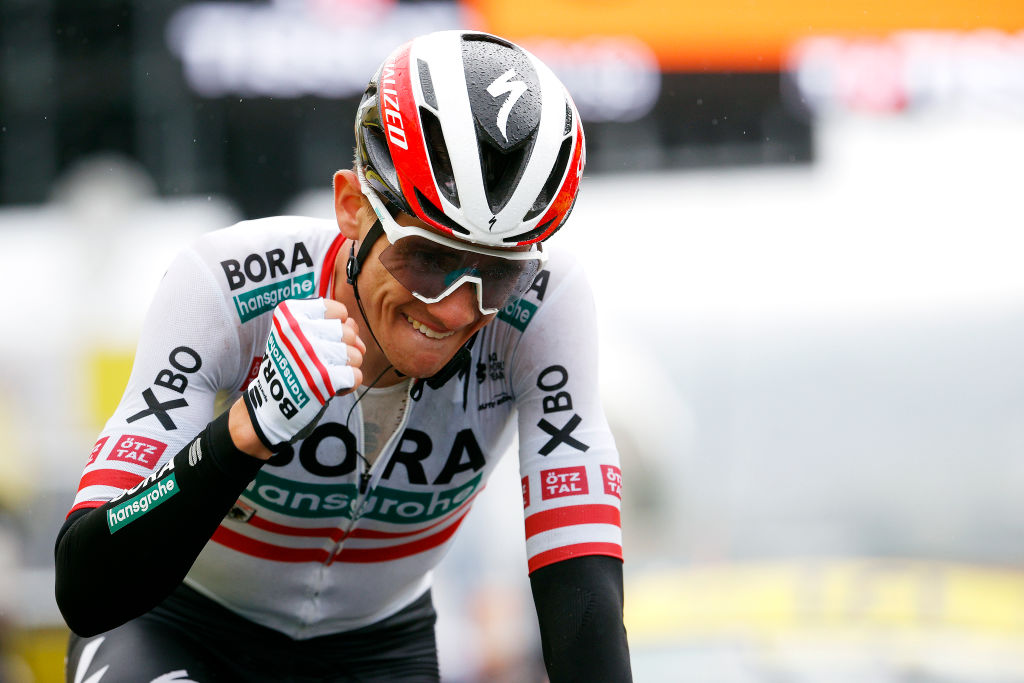Tour de France: Going long pays off for Konrad in Saint-Gaudens
Bora-Hansgrohe rider still believes Pogacar can be beaten in overall battle

Less than a week after Nils Politt claimed a fine solo victory in Nîmes, Bora-Hansgrohe hit the Tour de France jackpot again in rain-soaked stage 16 to Saint-Gaudens as Austrian National Champion Patrick Konrad triumphantly rode home alone ahead of the field.
Ahead of his closest pursuer, Sonny Colbrelli (Bahrain Victorious), by 42 seconds when he crossed the line, Konrad said his decision to go for a lengthy, solo attack 37 kilometres from the line was partly due to finishing second behind Bauke Mollema (Trek-Segafredo), after he and the Dutchman were in a breakaway on Saturday.
“I’ve already been in the break three or four times in this year’s Tour. It seemed like it didn’t matter whether it was Bauke Mollema or Matej Mohoric,” Konrad said. "They always went really early while I was waiting for the final. So, I said to myself ‘this time I will be the first guy to make a decision to go for it’. I knew I had the legs to try.”
As for why the long-distance breaks are succeeding so often in this year’s Tour, Konrad said it was a knock-on effect of it being such an aggressively raced Tour from the top downwards.
“There’s so much fighting to get in the break and it’s been so hard as a race that everybody’s tired,” he said. “So as soon as you get a gap of 30 seconds or a minute it’s really hard for anybody to pull you back. You just have to keep going at your own rhythm and normally you’ll make it.”
On top of that for a rider like Konrad to succeed, he needed the green light from his team to take part in such breaks for lone glory, particularly when they have GC interests with Wilco Kelderman and, until he quit, the sprint battles with Peter Sagan as well.
As with Politt, who only had just one previous win in his palmares in the Tour of Germany, Konrad’s success on stage 16 Tuesday was just the third and by far the biggest victory of the 29-year-old’s career. It was also the third win for Austria ever in the Tour de France, with the previous stage wins going to Max Bulla in 1931 and Georg Totschnig in 2005.
Get The Leadout Newsletter
The latest race content, interviews, features, reviews and expert buying guides, direct to your inbox!
“Austria isn’t the biggest country in cycling and I’m now one of the few guys who’s taken a Tour stage, too,” Konrad, who has two top-10 overall finishes in the Giro d’Italia as his most outstanding previous results, reflected afterwards. “That makes me really proud.
“Before I’d always focussed on GC. But this year, I completely changed my ambitions and decided to switch to stages instead.
“To get this win in the Austrian national champion’s jersey representing my country in the biggest [race] in the world makes it even more special.”
Unlike Politt, who only began hunting for stages when Sagan quit, Konrad said he’s always had carte blanche to try for individual victories since the Tour began and "if I had the legs".
But while agreeing that in the mid-term winning in such hilly terrain gave him lots of hope for the upcoming Olympic Games, he emphasised that for now he was concentrating fully on the Tour’s upcoming mountain stages and the team’s GC interests.
“My big goal is to be with Wilco and my job there is only done in Paris," he said. "I’m looking forward to the next mountain stages and giving him all the support I can.”
The question of whether Kelderman, currently sixth overall, and the other GC contenders can still beat Tadej Pogačar (UAE Team Emirates) though when the Slovenian has such a colossal advantage overall is the issue which will likely dominate the two remaining Pyrenean stages.
“If Pogačar is performing like he did previously in the mountains, it will be really hard to close that gap,” Konrad argued, “and he’s also a really good time triallist so he’s got that as well in his favour.
“But never said never. This Tour is super-hard and and it’s hard to control. I’d say the first nine riders overall still have the possibility of winning this year’s Tour.”
Alasdair Fotheringham has been reporting on cycling since 1991. He has covered every Tour de France since 1992 bar one, as well as numerous other bike races of all shapes and sizes, ranging from the Olympic Games in 2008 to the now sadly defunct Subida a Urkiola hill climb in Spain. As well as working for Cyclingnews, he has also written for The Independent, The Guardian, ProCycling, The Express and Reuters.
